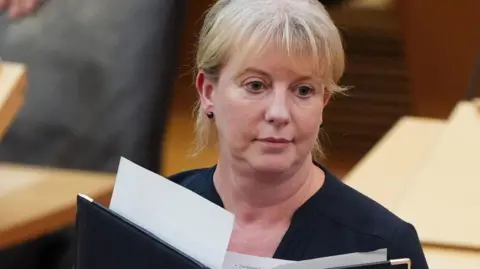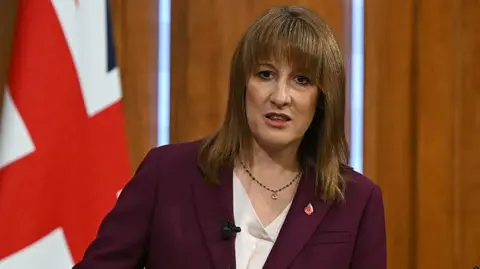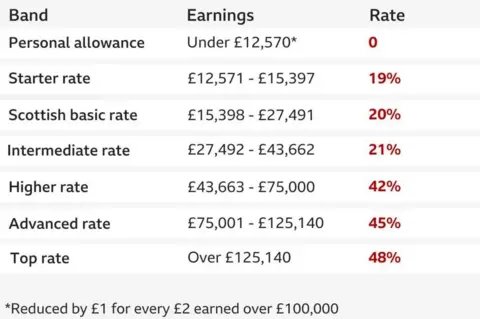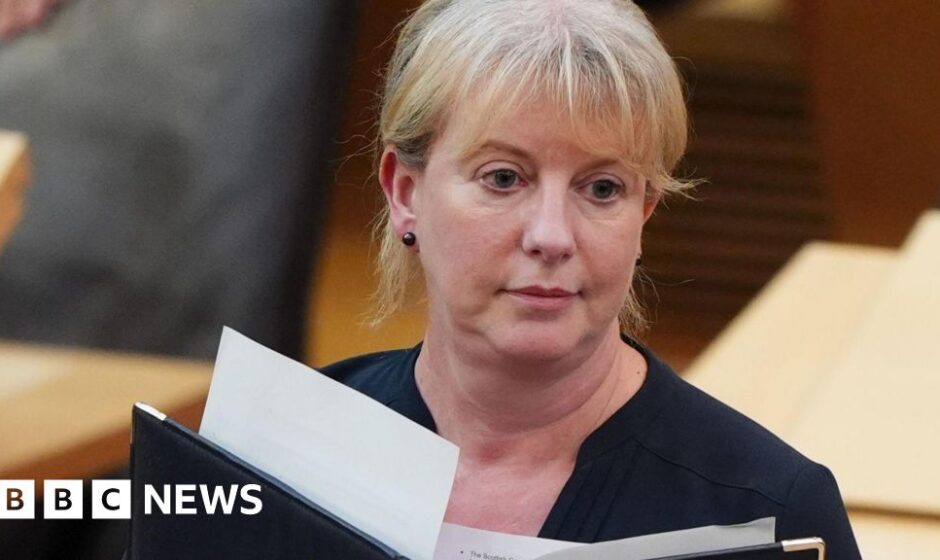 PA Media
PA MediaScotland’s finance secretary has asked for a meeting and assurances from the chancellor over speculation she will raise income tax in her Budget.
Such a move, which Rachel Reeves refused to rule out last week, would lead to an automatic deduction from Scotland’s funding from the Treasury.
Shona Robison said Labour should ditch “outdated” fiscal rules which include making sure day-to-day spending is funded by tax revenues.
The Treasury said it would not comment on speculation but claimed its previous “record settlement” for Scotland meant it receives 20% more funding per head of population than the rest of the UK.
In an unusual pre-Budget speech in Downing Street last week, Reeves said she would make “necessary choices” in her tax and spending plans later this month after the world had “thrown more challenges our way”.
She did not rule out a U-turn on Labour’s general election manifesto pledge not to raise income tax, VAT or National Insurance, leading to speculation that a tax rise is on the way.
Any increase in income tax by the UK government could see a fall in the block grant Scotland receives from Westminster as a result of a funding agreement called the Block Grant Adjustment.
The Fraser of Allander Institute has estimated a 2p rise in the basic rate of tax elsewhere in the UK could cut Scotland’s budget by up £1bn, unless the Scottish government matches the increase with its own tax rise.
Robison said the chancellor’s speech had “piled uncertainty on uncertainty” and that she had requested an “urgent meeting” where she would set out three tests.
These are:
- The chancellor “ditch her outdated, restricted fiscal rules” and faces up to a “new reality”.
- All money raised from tax increases is invested in public services, meaning the block grant also increases as a result
- Confirmation that Scotland will not see a cut in funding
She said: “They came to office promising an end to austerity, so to impose it on Scotland would be a political betrayal from which Labour would never recover.”
 Getty Images
Getty ImagesIncome tax in Scotland
Ahead of the last general election First Minister John Swinney urged the next UK government to replicate Scotland’s devolved taxation system where higher earners pay more in tax.
People living in Scotland earning below about £30,300 pay slightly less income tax than they would elsewhere in the UK, with a maximum saving of about £28.
Above that threshold they pay increasingly more as earnings increase. Someone on £50,000 in Scotland pays £1,528 more than they would in the rest of the UK. That rises to £5,207 for someone on £125,000.

Swinney recently said he had no plans to make any further changes to taxation in Scotland ahead of next May’s Holyrood election.
However, following the chancellor’s speech last week he has now declined to rule this out.
What is the Treasury saying?
The Treasury said it could not comment on the chancellor’s plans ahead of her Budget, but it said she had outlined the global and long term economic challenges that would influence her decisions.
A spokesperson said: “Our record funding settlement for Scotland will mean over 20% more funding per head than the rest of the UK.
“We have also confirmed £8.3bn in funding for GB Energy-Nuclear and GB Energy in Aberdeen, up to £750m for a new supercomputer at Edinburgh University, and are investing £452m over four years for City and Growth Deals across Scotland.
“This investment is all possible because our fiscal rules are non-negotiable, they are the basis of the stability which underpins growth.”
Why would a UK tax hike cut Scotland’s budget?
A change to UK income tax would apply directly to residents in England, Wales and Northern Ireland – but it could also have an impact on Scottish taxpayers.
When the devolved government in Scotland was given more tax raising powers nearly a decade ago, an agreement called the Fiscal Framework was agreed setting out how the new system would work.
Part of that was something called the Block Grant Adjustment (BGA) which meant the funding Holyrood receives from Westminster was reduced to take into the account money the Scottish government was now able to raise directly.
The BGA was intended to stop either government being better or worse off due to devolution.
It means the UK government is able to deduct funds from the block grant that it estimates it would have received if tax-raising powers were not devolved.
If the chancellor raises income tax, the BGA will also change.
Scotland will then have to generate more tax revenue or cut public spending in order to avoid a budget shortfall.
The Scottish Budget will be announced on 13 January.
#Scotlands #finance #secretary #asks #chancellor #assurances #tax #plans



